
red meat for debate
the absurdist food wars continue, but most of this "data" is still junk
TL/DR:
recent “studies” purporting to show that red meat is associated with/causes increased diabetes risk look to be deeply fraught.
they are not studies, they are models using estimations to fuel estimations to fuel models
the base nutritional data they work from is low quality survey data that is not up to the task of drawing conclusions like this
the “researchers” have extreme conflicts of interest and their claims contradict well understood biological pathways.
these claims should be ignored.
DISCUSSION:
since time out of mind, most “official” food advice has been stupid.
the studies are junk, the data is worse, and it’s nearly all paid for by people with axes to grind and forgone conclusions to support.
it’s a circus.
every 3 years eggs flip from being a wonderous superfood you cannot live without to instant death from cholesterol driven spontaneous combustion. then they flip back.
the shift away from fat to toward low-fat, high-sugar food in the 80’s almost certainly set off the obesity epidemic going on today.
stupid was bad enough, but food has become increasingly political and is more and more the province of the same crony capitalism clownworld cretins as some other products one might point to of late.
and this is making it dangerous.
folks like the USDA have always been a joke on “nutrition,” a marketing arm for the producers. the food pyramid was famously lacking in any scientific backing. it was just what producers wanted to sell and so an industry org with no grounding whatsoever in nutrition created a diagram that was used for decades to teach children what to eat.
new attempts have become even more ridiculous and seem now to have shifted increasingly into universities that have been bought and paid for by industry sponsors and it’s turning nutrition into a joke. (and not a funny one)
the media, of course, love this stuff because “eat this and shed bellyfat” sells even better than the hotcakes that made you fat in the first place and “this food supports your political prejudices” is better still.
a whole industry/ecosystem is emerging to shovel dietary dingbattery at you.
and business is good.
one of the more aggressive gangs here seems to reside at tufts university and cluster around the grants and goodies that funded their horrendous “food compass” system whose output is so bad that a lot of people mistook it for parody.
a set of researchers applied this model and published the results in the journal of nutrition.
it recommended frosted mini wheats, sweet potato fries, nonfat frozen yogurt (generally loaded with sugar), and chocolate covered almonds while calling things like almond M+M’s and lucky charms cereal healthier than ground beef or cheese.
this looks like a pretty surreal pile of advice.
online, many mis-described this as a new USDA pyramid, but it seems to originate from tufts and their new “system” as assessed by other researchers to highlight its failings.
the food compass is, however, funded by the NIH, other federal agencies, and some of these researchers (notably dr. dariush moaffarianalso) get quite a lot of money from the gates foundation (notable investors in and proponents of “fake meat.”)
and when the powerful and connected start losing their collective posteriors in the “pink pea goo faux meat oil slime” companies they funded, well, you’re gonna get a ride to the rescue as they pay the modern day food fantasists to vilify moo-meat and claim that eating bugs and other “beyond gruesome” meat subs that smell like burning plastic when you cook them and taste far worse is the path to health and a better world.
and they, of course, find ready allies among the rest of the usual gang as the climate and gender/race war folks cannot wait to jump in and spread the misery around. there is essentially no sound science here, but it’s not going to stop the pseudoscientific food grifters from grifting and making up wild hallucinatory nutritional landscapes to eschew the healthful and push the preposterous to sell a few bookie wooks.
very few actually ever get taught any meaningful nutrition (more’s the pity) and we have really crossed the rubicon into clownworld and so let’s see if we can take this back from the aspirationally intersectional and return to a sound basis in fact.
we start here with folks like jenny who are pleased to proclaim that the future of food is gendered.
this is possibly clever marketing by glossolalia generator to find unoccupied venn intersects to politicize, but if you’re looking for “warning signs and how to spot them” well, here you go:
such folks tend to have the unerring noses of truffle hounds for pseudoscience and misattribution and i have found it useful to see what they are waving around as a barometer of what’s being sold to the unsuspecting.
today’s product appears to be this:
meat causes diabetes.
her backing for this appears to be this CNN article which in turn refers to this article in NATURE.
nearly everyone on the authors list has gates money, most NIH as well, and many a bewildering variety of the “usual suspects” from the vail institute to nestlé and danone, which i found particularly fun given the study’s yogurt advocacy. (though i do like whole milk plain yogurt quite a lot)
(see “competing interests p 22 of study).
overall, it’s a pretty wild claim that looks essentially impossible on its face.
let’s look:
the whole idea that meat is a major driver here is deeply implausible.
type 2 diabetes is insulin resistance. you develop it by constantly jamming your blood sugar levels into the stratosphere and stressing your pancreas to produce huge amounts of insulin to mop it up.
that’s insulin’s job. it takes sugar out of your bloodstream and stores it. glucagon does the opposite and causes your body (mostly your liver) to dump sugar back into your blood. it’s seeking a balance and finding such a balance is easier when it can occur slowly. this is why your body also uses hormones like amylin that regulates/inhibits food uptake predominantly by delaying post-prandial gastric emptying (the speed at which food from your stomach enters your intestines).
what your body likes is “slow and regular, no huge swings.” meat accomplishes this nicely, slows digestion, and moderates the speed with which sugars enter the blood stream.
most meat lacks meaningful carbs/sugars. eating it results in slower sugar release for carby foods eaten with it (amylin) and even some calls for sugar release (glucagon). gluconeogenesis (converting proteins and fats into sugars that the body can use for energy) is a similarly slow process that does not lead to meaningful blood glucose overshoot.
ask anyone who uses a CGM (continuous glucose monitor) worn by diabetics and athletes to measure blood sugar in real time:
you do not see much of a sugar jump from eating meat. (unless you slather it with 8 oz of mostly sugar BBQ sauce or scarf down 1000 calories of fries with it, but even then, the sugar will hit you more slowly that it would had you eaten the sauce or fries alone.)
this is not how you exhaust a pancreas and accumulate the damage from long term excessive blood glucose.
now, what’s going to drive your blood sugar WAY up is carbs, especially “fast” carbs like sugars and especially processed sugars like sucrose or high fructose corn syrup that have much higher glycemic indexes than “slow” sugars like fructose in fruit or medium sugars like lactose in milk. this gets called glucose index. (GI)
“The GI is calculated by comparing the speed and extent to which a food containing 50g of carbohydrate is broken down into glucose in the blood against a 50g dose of pure glucose.”
pure glucose = 100
maltodextrin = 110 (faster than glucose)
high fructose corn syrup = 87
table sugar = 65-80
honey = 50
lactose = 46
fructose = 23
you multiply this by the number of grams of the sugar to get “glycemic load.” (GL)
GL is what spikes insulin and spiking insulin over and over is what leads to insulin resistance and type 2 diabetes. it also tend to correlate to over-eating, obesity, and a whole pile of other bad outcomes and failures to feel well.
this is the real game on type 2 diabetes.
not all carbs are equal.
one coke will drive more rapid, poorly moderated blood sugar rise than eating steak until you are stuffed or a whole bowl of plain oatmeal. one class of “fruit juice” with a bucket of added sugar will FAR exceed eating the fruit from which it was made.
this is about spiking sugar to wicked levels. drink a 64oz mountain dew big gulp and you are WAY outside your evolved capacity. keep doing it and you get damage.
meat does NOT do this unless you mix it with piles of “not meat” full of sugars, but eating ribs covered in HFCS sauce and then blaming “beef” for diabetes is like drinking 9 vodka sodas and claiming it was the soda water that got you drunk and the lime than made you hungover.
and even the tufts researchers know this. their claims are being badly misrepresented by people who do not seem to have read the article much less the paper.
“Our study suggests poor carbohydrate quality is a leading driver of diet-attributable type 2 diabetes globally,” says senior author Dr. Dariush Mozaffarian, a professor of nutrition at Tufts University and professor of medicine at Tufts School of Medicine in Boston, in a statement.”
"processed meat" is listed as one of a number of causes with “unprocessed red meat” thrown in, but is "modeled" and the serving sizes and proportions often appear estimated or backed into.
eat too much ANYHTHING and you get fat and up your risk and “processed meats” are often loaded up with added sugars. this leads to all manner of cross comparability issues. you can see how high income societies invert patterns from low.
“Proportions of diet-attributable T2D were generally larger in men than in women and were inversely correlated with age. Diet-attributable T2D was generally larger among urban versus rural residents and higher versus lower educated individuals, except in high-income countries, central and eastern Europe and central Asia, where burdens were larger in rural residents and in lower educated individuals”
how can we separate this claim about red meat making you diabetic from “rich societies eat more red meat, bad processed food, and tend to be fatter?”
the authors look to pin down the cause:
Researchers found eating too many unhealthy foods was more of a driver of type 2 diabetes on a global level than a lack of eating wholesome foods, especially for men compared with women, younger compared to older adults, and in urban versus rural residents.
Over 60% of the total global diet-attributable cases of the disease were due to excess intake of just six harmful dietary habits: eating too much refined rice, wheat and potatoes; too many processed and unprocessed red meats; and drinking too many sugar-sweetened beverages and fruit juice.
Inadequate intake of five protective dietary factors — fruits, nonstarchy vegetables, nuts, seeds, whole grains and yogurt — was responsible for just over 39% of the new cases.
and this list of full of obvious culprits but this model seems to be taking beef along for an implausible ride driven by covariates.
it’s also extremely important to note the word “model” there.
this is NOT a study with controls and clear data.
it’s a model.
and again, the researchers know this even if so many of the readers seem not to.
even CNN picked this up in their article (though they buried it at the end)
“Our modeling approach does not prove causation, and our findings should be considered as estimates of risk,” the authors wrote.
much of this is not even regression, it’s a monte carlo simulation using other simulations as inputs.
“Data are presented as the central estimate (median) and the corresponding 95% UI, derived from the 2.5th and 97.5th percentiles of 1,000 multiway probabilistic Monte Carlo model simulations.”
and that’s essentially assumption mining.
it requires assigning multiple values to an uncertain variable to achieve multiple results and then averaging the results to obtain an estimate.
it’s all a function of start state guesses and in highly multivariate systems, it’s prone to significant abuse/slanting.
they used the same to estimate standard deviation on nutrition and made “estimates” about “standard serving sizes”
but even if it were accurate in its parameter projection (which looks stunningly implausible, read through p16 on estimation of gamma parameters to see how it’s estimations feeding estimations feeding estimations feeding models), there is another glaring foundational issue:
it’s not at all clear to me that this methodology is remotely able to generate useful risk estimates because the bedrock data quality is so poor and so inconsistent.
and that makes even the best math into GIGO.
the study uses the “global dietary database” to get food intake estimates on a thin “11 dietary factors” (oddly considerably fewer than GDDD collects) but the real issue is that NONE of this is hard data. it’s all surveys and people are notoriously awful at gauging how many grams of X or Y or Z they consumed or how many calories they ate and where they came from or how many times a week they eat food with added sugar.
this data is just not up to the task of projection modeling into these associations especially as it’s extremely incomplete, cannot be cleaned for cross correlations or local reporting biases, has huge numbers of unknowns and unknown cross correlates, and most of all because there is just no way to tell if or reason to suspect it’s accurate.
do people really tell the truth about what they eat? do they even know? can you even know from this if an issue is “beef” or “BBQ sauce”? it seems not. are western rich eating clean cuts of meat while the poor are eating them covered in high fructose coronary syrup? is there wide variance in the restaurants they go to? so many unanswerables.
there is no validation here. no control group.
bottom line:
this is very low quality data.
it might be “the best we have” but as the song goes “sometimes your best isn’t good enough.”
this is one of those times.
all over this space, much of the data is stunningly low resolution. the whole space is and claiming “a body of research says” looks pretty threadbare.
there are a bunch of “associational studies” (like this one) that get trotted out to claim “association” or even “cause” but to call their methodologies “low quality” and their data “suspect” is likely being VERY generous.
ask yourself: does this look like good data to you?
self reporting of “what did you eat in the last 4 years?”
imagine trying to, with the absolute best of intentions, answer this question to within +/- 25% of the grams of red meat or sugar you ate in the last 4 years. now run it through the “most people have no idea what they are eating” filter.
data like this is simply not of high enough quality to be used to make claims at variance with well understood and characterized biological processes and to recommend/demand changes in the way we live, eat, and set up food chains.
this is not science, it’s marketing.
i miss the old days when “using a model to sell food” meant attractive people in bathing suits.
this is not real data, it’s duplicity and the fairly tepid claims of researchers are being blown WAY out of proportion and misrepresented by folks with products to push and books to sell.
you simply do not want to trust bad survey data over good biology on a topic like this.
so before anyone runs out and switches to made up meat slurry beyond bad for you goop, perhaps consider the source and the agendas thereof…
(and pity those who have no choice in the matter…)





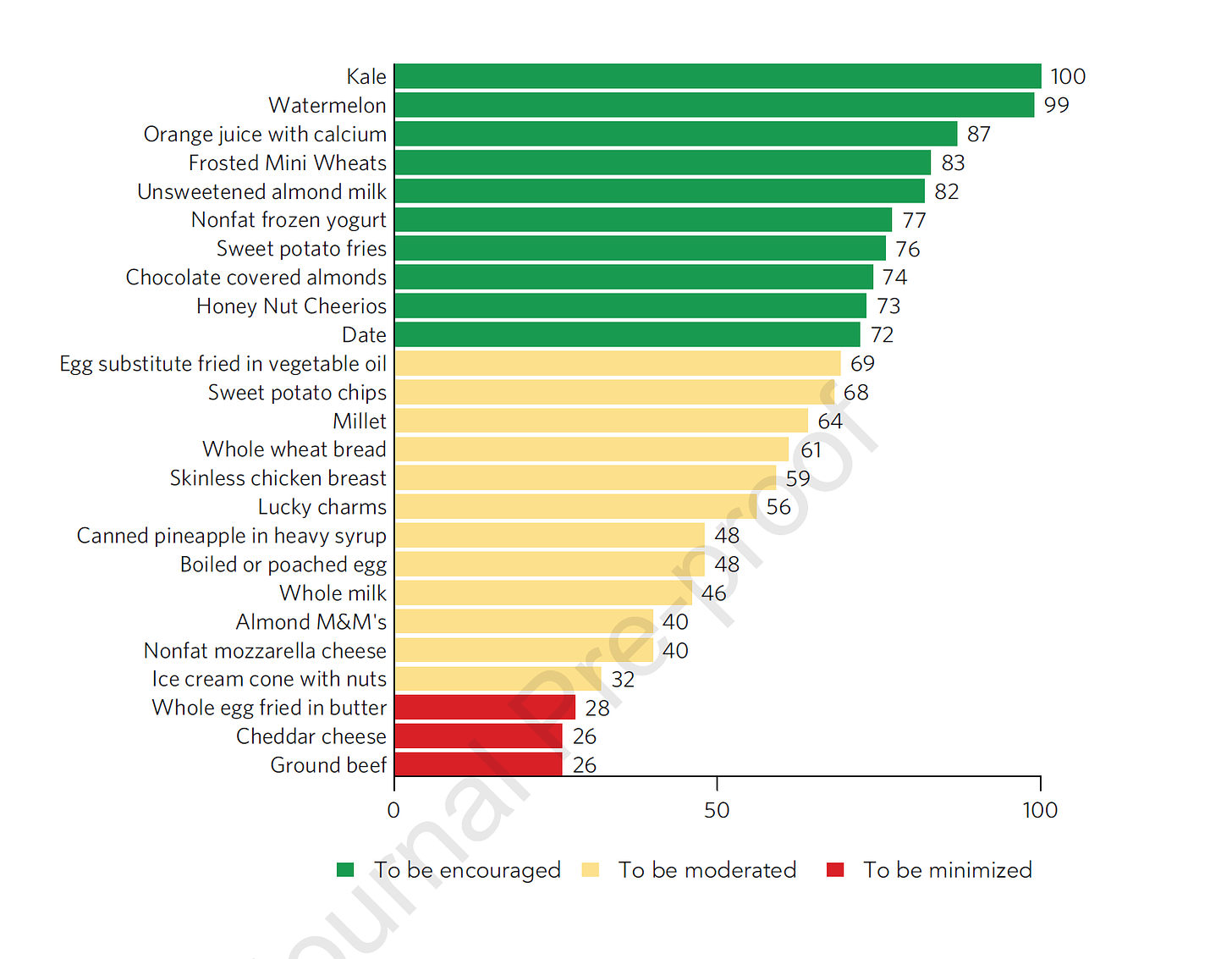

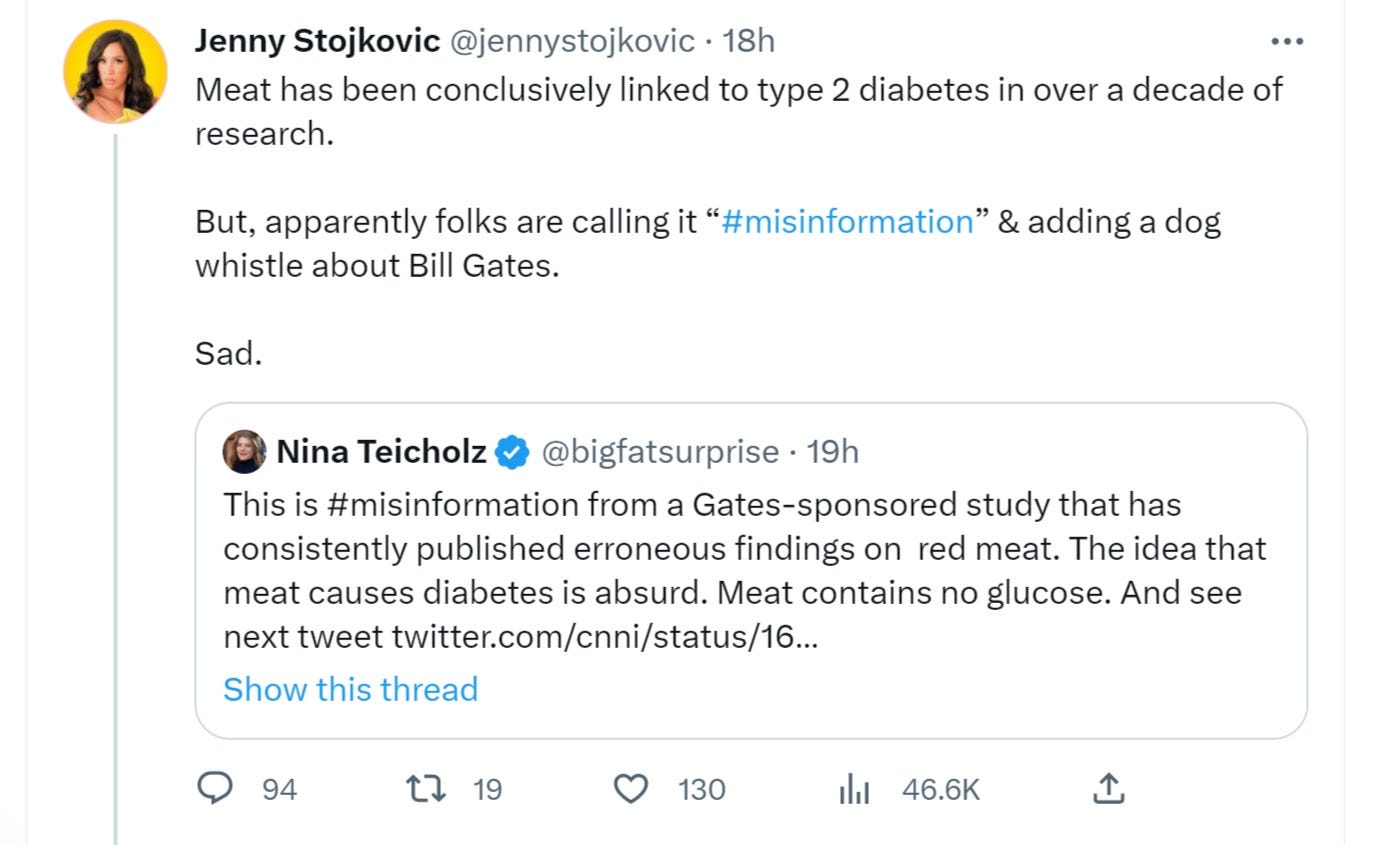

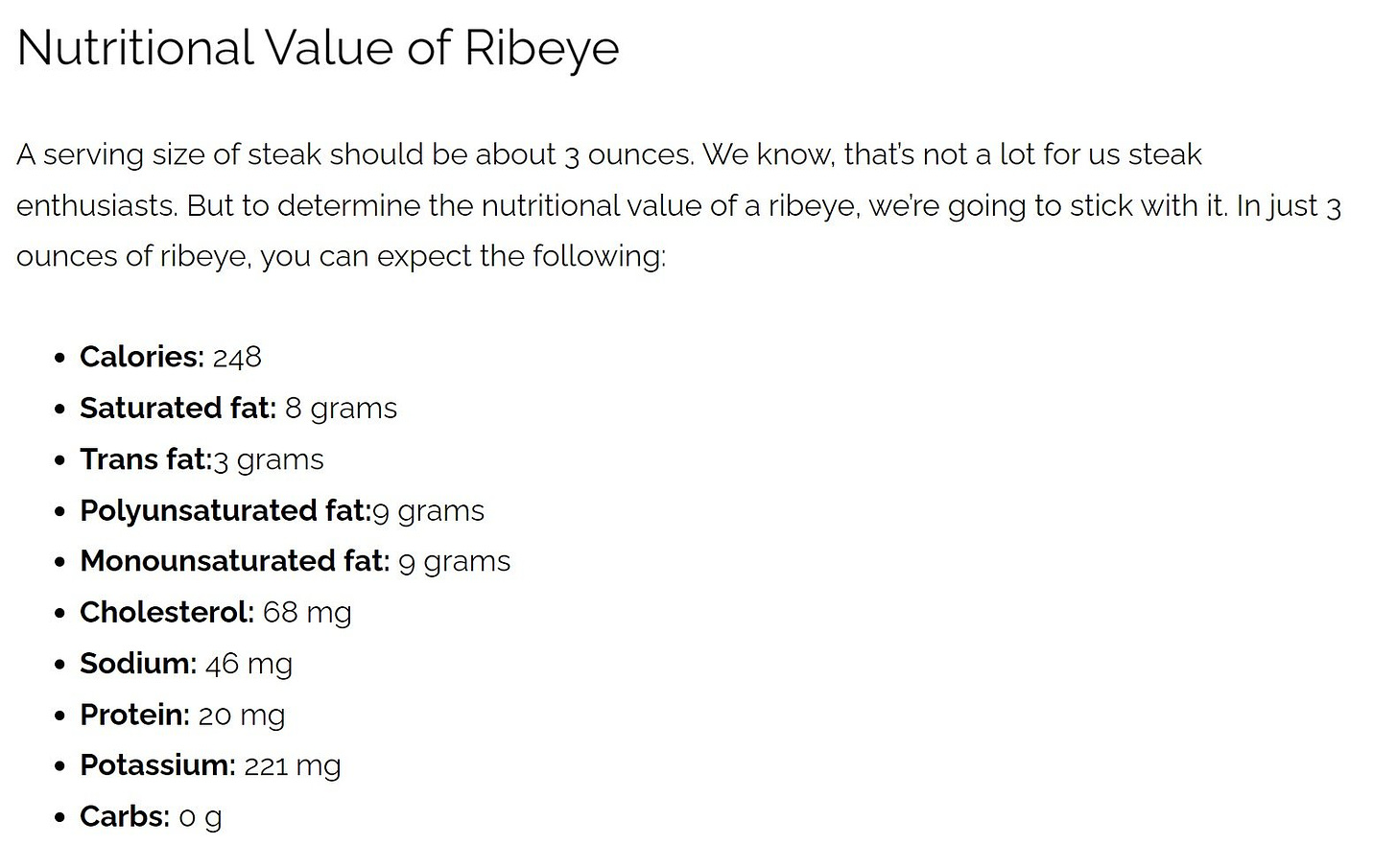
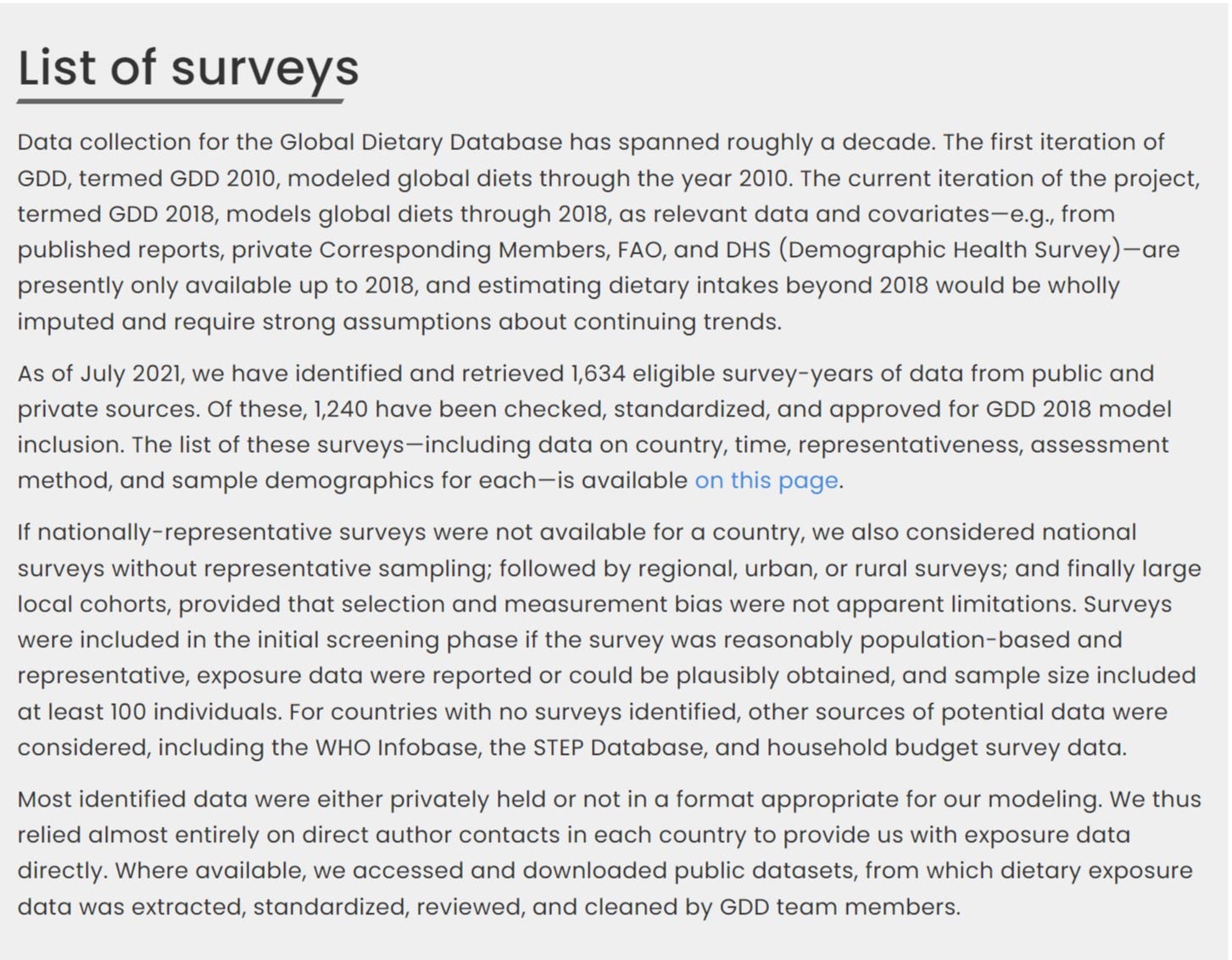









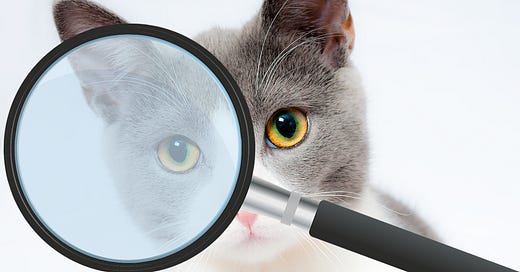



Looks to me like they're adopting the covid model of bullshit. This is what The Swamp does -- it seeps into everything.
A hilarious skit about food advice:
https://www.youtube.com/watch?v=5Ua-WVg1SsA
The day they come for my medium rare filet is the day I storm the capital.
Hope ya'll support me in my Food Coupass!